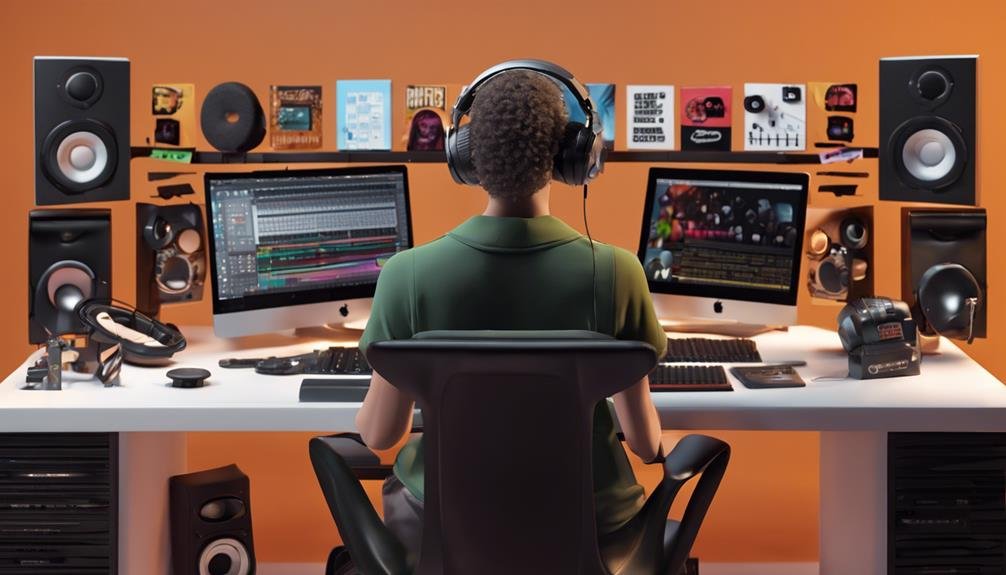How to Start a Business in Music Production?
To start a music production business, first, set up a home studio with quality equipment and optimize acoustics. Develop skills in software, mixing, mastering, and music theory. Build a diverse portfolio showcasing your projects and collaboration skills. Market your services on social media, showcase work, and network with professionals. Utilize targeted ads, collaborations, and a strong online presence. Set strategic prices based on market research, and manage finances wisely with detailed budgets and diversified income streams. Master these steps to kickstart your successful music production venture.
Key Takeaways
- Invest in quality equipment for professional sound.
- Develop diverse skills in production and mixing.
- Showcase a strong portfolio to attract clients.
- Network with industry professionals for opportunities.
- Set competitive prices based on market research.
Setting Up Your Home Studio
To create a professional home studio for music production, you should carefully select the right equipment and optimize the acoustics of your space. When it comes to setting up your home studio, soundproofing tips are essential for ensuring high-quality recordings.
Budget-friendly options like using heavy curtains, carpets, and acoustic panels can effectively dampen sound and prevent outside noises from seeping into your recordings.
In terms of home studio layout, maximizing space is key. Consider utilizing wall-mounted shelves to store equipment and keep the floor area clear for movement and additional seating.
Placing your desk against a wall can help with cable management and create a more organized workspace. Additionally, investing in multi-functional furniture such as a desk with built-in storage can further optimize the available space in your studio.
Choosing the Right Equipment
When selecting equipment for your music production setup, it's important to prioritize quality over quantity to guarantee excellent sound output and efficiency.
Look for durable pieces that will last long-term to avoid frequent replacements. Regular equipment maintenance is essential to ensure peak performance.
Consider budget-friendly options and explore alternatives that offer good quality without breaking the bank.
When upgrading, focus on key components like your computer's processor and RAM for smooth recording and editing processes. Invest in high-quality microphones and headphones for accurate sound reproduction.
Studio monitors are essential for mixing and mastering, so choose ones that provide a balanced sound. A reliable audio interface will help maintain a clear signal flow.
Additionally, having a MIDI controller can enhance your music creation process.
Developing Your Skills
To excel in music production, you must focus on skill-building techniques and seek continuous learning opportunities. Enhance your abilities by mastering various software tools, refining your mixing and mastering skills, and understanding music theory.
Stay updated with industry trends and experiment with different styles to broaden your expertise in this competitive field.
Skill-Building Techniques
Enhance your music production skills by consistently practicing and experimenting with different techniques to expand your capabilities and creativity. Engaging in online courses and attending hands-on workshops can provide structured learning opportunities, while practice sessions and collaborative projects offer practical experience and networking possibilities.
To effectively build your music production skills, consider utilizing a variety of skill-building techniques. The table below highlights different methods you can incorporate into your skill development routine:
| Skill-Building Techniques | Description | Benefits |
|---|---|---|
| Online Courses | Enroll in courses on music production platforms to learn new concepts and techniques. | Access to structured learning materials |
| Hands-on Workshops | Attend workshops to gain practical experience and receive guidance from industry professionals. | Networking opportunities and real-time feedback |
| Practice Sessions | Dedicate regular time to practicing different aspects of music production to refine your skills. | Improvement in technical abilities and workflow efficiency |
| Collaborative Projects | Engage in projects with other musicians and producers to explore new ideas and perspectives. | Enhance teamwork and creativity through collaboration |
Continuous Learning Opportunities
Engaging in a continuous cycle of learning opportunities is essential for developing and refining your music production skills. To stay current in this ever-evolving industry, consider enrolling in online courses and workshops that cover topics like advanced audio engineering techniques, music theory, and mastering software tools. Online platforms offer flexible learning schedules, allowing you to enhance your skills at your own pace.
Industry conferences and webinars are also valuable resources for expanding your knowledge base and networking with professionals in the field. These events provide insights into the latest trends, production technologies, and business strategies. Take advantage of panel discussions, keynote presentations, and networking sessions to gain a broader perspective on the music production landscape.
Continuous learning not only keeps you updated on industry developments but also fosters creativity and innovation in your work. By investing time and effort into your professional development, you position yourself for success in the competitive world of music production.
Building Your Portfolio
To start building your portfolio in music production, focus on showcasing quality projects that highlight your diverse skills. Potential clients and collaborators will be drawn to a portfolio that demonstrates your ability to work on a variety of music genres and projects with excellence. Make sure each piece in your portfolio reflects your unique style and expertise, setting you apart in the competitive music production industry.
Showcase Quality Projects
Consistently showcasing high-quality projects is important for building a strong portfolio in music production. Project promotion plays a vital role in attracting new clients and retaining existing ones. By highlighting your best work, you not only demonstrate your skills but also increase client satisfaction.
Make sure to showcase a diverse range of projects to demonstrate your versatility and expertise. A portfolio with variety not only appeals to a wider audience but also showcases your ability to work across different genres and styles.
Furthermore, industry recognition can greatly boost your credibility as a music producer. Make sure that your portfolio includes projects that have garnered positive attention or awards within the industry. This can help you stand out from competitors and attract more clients who are seeking top-tier production services.
Highlight Diverse Skills
Demonstrate your versatility and expertise in music production by highlighting a diverse set of skills in your portfolio. To stand out in the competitive music production industry, showcasing a wide range of abilities is essential. Here are some key aspects to keep in mind when highlighting your diverse skills:
- Creative Collaboration: Illustrate your ability to work effectively with artists, songwriters, and other music professionals to bring creative visions to life.
Highlight successful collaborations that resulted in unique and innovative musical projects.
- Industry Trends: Stay updated on the latest trends and technologies in music production.
Showcase your adaptability and willingness to embrace new techniques and tools to deliver cutting-edge productions that resonate with current industry standards.
- Entrepreneurial Mindset and Project Management: Showcase your entrepreneurial spirit by highlighting successful projects where you demonstrated strong project management skills.
Detail your ability to oversee all aspects of a project, from budgeting and scheduling to production and delivery, showcasing your capability to handle multiple tasks efficiently and professionally.
Marketing Your Services
Promoting your music production services effectively requires a targeted and multi-faceted approach to reach your desired audience. Utilizing social media platforms like Instagram, Facebook, and Twitter can help showcase your work and attract potential clients. Running targeted ads on these platforms can further enhance your reach by specifically targeting users interested in music production or related topics.
Collaborations and partnerships with artists, record labels, and other music professionals can also greatly boost your visibility. By working with established names in the industry, you can leverage their audience and credibility to attract more clients to your services. Look for opportunities to collaborate on projects, offer your services for joint ventures, or even sponsor events to increase your exposure.
Remember to maintain a consistent online presence, engage with your audience, and showcase your unique selling points to stand out in a competitive market. By combining social media strategies, targeted advertising, and partnerships, you can effectively market your music production services and grow your business.
Networking in the Industry
To expand your reach and establish valuable connections within the music production industry, networking is key. Attending industry events provides an excellent opportunity to meet professionals, share experiences, and learn about the latest trends.
Collaborating with other music producers can also open doors to new projects and enhance your skills through shared knowledge and expertise.
Industry Events: Make sure to attend conferences, workshops, and trade shows related to music production. These events are perfect for networking and staying updated on industry developments.
Collaborations: Working with other producers, artists, or music professionals can lead to new creative opportunities and expand your portfolio. Seek out like-minded individuals to collaborate on projects that can benefit all parties involved.
Online Platforms, Social Media: Utilize online platforms and social media channels to connect with a broader audience and engage with potential clients or collaborators. Building a strong online presence can help you showcase your work and attract new opportunities in the music production industry.
Setting Your Prices
Determining your prices in music production involves strategic considerations to confirm that your services are valued appropriately in the industry. When setting your prices, it's important to take into account various pricing strategies that align with your business goals.
Conduct market research to understand your competitors' pricing structures and customer expectations. Factor in your production costs, equipment investment, and labor to make sure your prices cover expenses while remaining competitive.
Customer negotiations play an important role in setting prices. Be prepared to discuss pricing with potential clients, explaining the value you provide and being flexible when necessary. Consider offering package deals or discounts for bulk services to attract more clients while maintaining profitability.
Revenue projections are essential to understanding how your pricing strategy impacts your overall income. Calculate different scenarios to determine the best price points that maximize revenue while considering profit margins.
Managing Your Finances
Managing your finances in music production requires meticulous tracking of expenses and revenue to guarantee financial stability and growth. To secure your business thrives, consider the following budgeting tips and investment strategies:
- Create a Detailed Budget:
Start by outlining all your expenses, such as equipment costs, software subscriptions, marketing, and studio rent. Allocate funds for each category and regularly review your budget to make adjustments as needed.
- Diversify Your Income Streams:
Explore various revenue sources beyond just music production, such as offering mixing/mastering services, music lessons, or selling merchandise. This can help mitigate financial risks and generate additional income.
- Invest Wisely:
When investing in new equipment or software, conduct thorough research to ensure you're getting quality products that align with your business needs. Consider both short-term affordability and long-term benefits to make smart investment choices.
Frequently Asked Questions
How Can I Protect My Music Production Work Legally?
To safeguard your music production work legally, make sure you secure copyright protection for your creations. Additionally, draft and enforce contract agreements with collaborators, clients, and distributors to protect your intellectual property rights and maintain control over your work.
What Are the Best Strategies for Collaborating With Other Music Producers?
To excel in creative partnerships and networking with music producers, prioritize effective project management and clear communication. Establish shared goals, set timelines, and openly discuss expectations to foster successful collaborations. Networking is key.
Is It Essential to Have a Music-Related Degree to Succeed in This Industry?
Having a music-related degree isn't essential for success in this industry. Your educational background can provide knowledge, but connections, experience, and skills matter most. Networking, gaining hands-on experience, and refining your craft are key to thriving.
How Do I Handle Difficult Clients or Challenging Projects?
When dealing with difficult clients or challenging projects, managing expectations is crucial. Clear communication, setting boundaries, and addressing issues promptly can help. Conflict resolution skills are essential for maintaining positive relationships and successful outcomes.
What Are the Key Trends Shaping the Future of Music Production Business?
To excel in music production, embrace key trends. Technological advancements drive innovation, while industry regulations shape practices. Globalization fosters diverse influences, enabling remote collaboration. Stay ahead by leveraging digital tools, adapting to change, and fostering creativity in a dynamic landscape.
Conclusion
You've got the skills, the equipment, and the drive to start your own music production business. Don't let the fear of competition hold you back – there will always be a demand for talented producers like yourself.
Keep honing your craft, building your portfolio, and networking with industry professionals. With dedication and perseverance, you'll carve out your own niche in the music production world and find success.
So go ahead, take that leap and start your business today.







